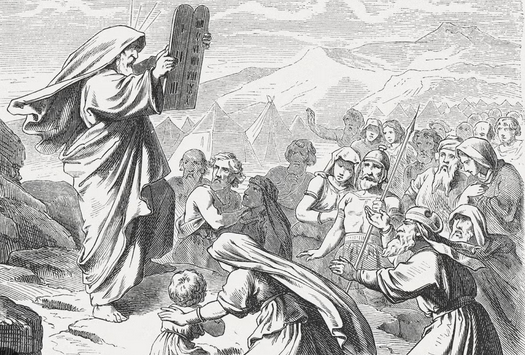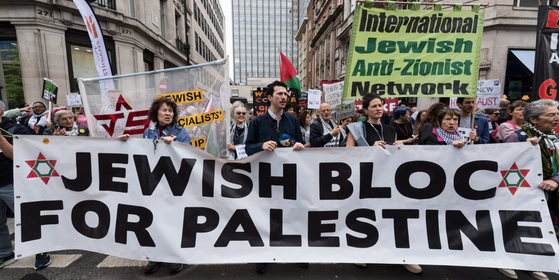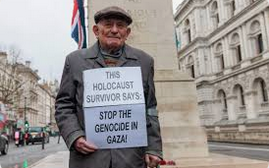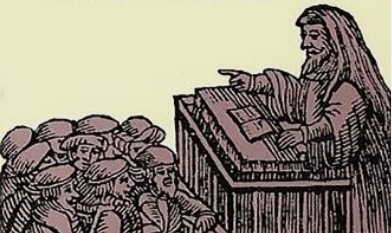Judaism & Zionism are not the same

In the Hebrew calendar the date today is 5 Sivan 5785. This day is significant as it marks Erev Shavuot, the eve of the Jewish holiday Shavuot. Shavuot commemorates the giving of the Torah at Mount Sinai and begins at sunset. Additionally, today is the 49th and final day of the Counting of the Omer, a period of spiritual preparation between Passover and Shavuot and recognising Moses receiving the ten commandments on Mount Sinai. Now I'm not particularly a religious person but I am minded of Moses coming down from Mount Sinai and in particular the sixth statement which in Hebrew is Lo tirtzach, which in the Christian Tradition is the sixth commandment of 'Thou shalt not kill'
Ever since Jonathan Arkush of the Board of Deputies of British Jews (BoDs) took to the BBC in 2016 in a shouty rant, loudly accusing the Labour Party of being riddled with antisemitism, the term has been flung about so frequently, and often so carelessly, that it’s lost much of its power. People who had never shown any hatred toward Jews were suddenly branded antisemites for criticising Israel or expressing solidarity with Palestinians. This overuse has created an ‘antisemitism fatigue’. People with no dog in the race are sick to the back teeth of it and, let’s face it, when has society shining a light on Jews ever resulted in a positive outcome? There’s a sense that the accusation has become more political weapon than moral warning. And this is a dangerous development. When real antisemites are being normalised in the US and in Europe and the Far-Right is taking ground everywhere, the public is less attuned to the real danger of antisemitism, less outraged, and more cynical. The post-Holocaust commitment to ‘never again’ only works when antisemitism means something real, something tangible and a call to arms against the very worst people in society. Not just anything politically inconvenient to an apartheid state and its supporters.
Of course, for the past 18 months, the Israeli government is using the same playbook. As global criticism of its actions in Gaza and the West Bank grows, it responds not with reflection, but with familiar accusations of antisemitism. Critics, including Jewish ones, are smeared or silenced. This conflation of antisemitism and Zionism creates significant tension in international politics, particularly on close allies of Israel, like French President Emmanuel Macron and UK Labour leader Keir Starmer. Even they can face sharp criticism from the Israeli government when they voice even modest concerns or criticisms about Israeli actions, especially in the context of the war in Gaza or treatment of Palestinians more broadly. Two weeks ago, Israeli Prime Minister Benjamin Netanyahu made that famously incoherent rant on TV accusing both of been HAMAS supporters and antisemitic, and that the Palestinian flag was akin to the Swastika. This strong defensive posture when Israel faces external criticism, even from long-standing allies shows how weak the position of Israel really is when it engages in war crimes.
This tendency reflects both domestic political considerations and a broader strategy to frame external critiques as either misunderstandings or unjust attacks on Israel’s right to self-defence. (I'll come on to self-defence in a bit) Of course, this approach is counterproductive, alienating allies and closing down space for constructive dialogue. Once again, the accusation is used not to protect Jewish people, but to shield Israel from accountability. This not only undermines the fight against genuine Jew-hatred, but also alienates people who would otherwise be allies in that struggle.
Judaism 101: There’s an old joke ‘Put two Jews in a phone box and you'll get three opinions.’ It's a tongue-in-cheek way of referencing the Jewish cultural tradition of debate, argument, and valuing dissenting views, often rooted in Talmudic scholarship. Not all Jews think the same. We are not the Borg and we don’t all support the Israeli government. In fact, there are many Jewish communities, religious and secular, who disagree with Israel’s actions and even with the idea of having a Jewish state at all. This blog will explain the difference between being Jewish and being a Zionist and show how many Jews around the world speak out against injustice, even when it comes from Israel.
Zionism is the idea that Jews should have their own country, and that it should be in the land of Israel. This idea started in the late 1800s, mostly in Europe, as a response to antisemitism and pogroms. Some Jews supported it. But others strongly disagreed. Some religious Jews believed that only the Messiah could bring Jews back to the Holy Land. Others thought trying to make a Jewish country would just cause more hate. Many Jews outside Israel in the diaspora are happy living in their home countries and don’t want their identity tied to a foreign state. In parallel with the pre-Israel movement towards and Israeli State, there was an equally powerful Bundist movement that underlined this.

So as much as the BoDs, BBC and mainstream media would have you believe otherwise, identifying as Jewish does not mean you automatically support the Israeli government. Judaism is a religion and culture. Zionism is a political movement and from the outset, many Jews opposed Zionism. Religious groups like Neturei Karta, although controversial and absoutely hated by the Zionists, still believe Jews are not allowed to have a state of their own before the Messiah comes. They often quote a part of the Talmud known as the ‘Three Oaths’ (Ketubot 111a), which says:
"The Holy One, blessed be He, made Israel swear not to go up to the Land of Israel with force... and not to rebel against the nations of the world."
This means Jews should not return to Israel by force or fight to create a state before the proper time. There are also progressive and secular Jews who oppose Zionism because of how Palestinians are treated. Groups like Jewish Voice for Peace in the US, Jewish Voice for Labour Jewdas and Na’amod in the UK say that standing up for human rights is part of being Jewish. They believe supporting justice for Palestinians is a Jewish value. They publicly speak out against Israel’s treatment of Palestinians. Some rabbis sign letters and join protests demanding better treatment for all people, not just Jews. In the US there is also a wide range of opinion. Many Jews, especially young ones, are questioning Israel and becoming more outspoken. Some synagogues, especially progressive ones, welcome people who are critical of Israel. Even in Israel, there are Jews who speak out. Groups like Breaking the Silence and Rabbis for Human Rights document abuse by the Israeli army and call for peace and equality. Some ultra-Orthodox communities in cities like Jerusalem still refuse to recognise the state altogether.
One clear example of how criticism of Israel is used as a political weapon is what happened to Jeremy Corbyn. While he was leader of the Labour Party, he faced endless baseless accusations of antisemitism, often from groups that support Israel. But as soon as he stepped down, those accusations faded almost overnight. Like fairy dust, they disappeared when he was no longer a threat. The BBC and much of the media told the country that the BoDs was the main voice for British Jews. What they didn’t say is that the BoDs is an advocacy group for Israel. They have a vested interest in silencing politicians like Corbyn who support Palestinian rights. This wasn’t just a coincidence. There is a well-funded and highly organised network of Zionist lobby groups, including in the Labour Party itself, working hard to shut down criticism of Israel. They use accusations of antisemitism to scare people into silence, even when that criticism is fair and based on facts. Only last week, the Metropolitan Police, which has been taking advice from pro-Israel lobby organisations, refused to speak to non-Zionist Jewish groups like Jewish Voice for Labour. This shows how deep the influence goes, even public institutions appear to be guided by groups that aim to silence dissenting Jewish voices.
The same strategy has been used on many others. Public figures like Gary Lineker, Roger Waters, Ken Loach, Kneecap and Charlotte Church have all been targeted with smears or backlash for speaking out about Palestinian rights or criticising Israeli policies. These attempts to silence prominent voices serve as a warning to others: speak out and you risk reputational damage, even when your views are grounded in human rights concerns.

Even more absurd, a significant number Jewish people have been expelled from the Labour Party on the grounds of antimemitism, simply for being critical of Israel. In fact, under Starmer, more Jews were expelled, and their groups proscribed on the grounds of antisemitism than any other demographic. This includes lifelong anti-racists and community organisers. One of the most heart-breaking cases is that of Stephen Kapos, an 87-year-old Holocaust survivor, who was arrested for the act of laying flowers in memory of Palestinian children killed in Gaza. When even survivors of the Shoah are treated as enemies for defending the humanity of others, we must ask: who benefits from defining Jewish identity so narrowly?
One key point key, and this is important. Israeli Government spokesmen and their supporters choose their words very carefully and rely on the biblical ignorance of their audience. When they say they are acting is self-defence, when they are clearly not, this is deliberate. Lets go back to the sixth statement. In Aseret HaDibrot, (the Ten Commandments), the more accurate translation of 'Thou Shat not Kill' in is 'Thou shalt not murder'. A distinction which refers specifically to unlawful killing, rather than all killing, such as in self-defence. This is verbal acrobatics: twisting words to justify murder, and is the absolute antithesis of Jewish teaching. The accusations of antisemitism handed out like confetti to people who question this and support Palestinian rights are used to reinforce this fiction.
There is a lot of confusion about what counts as antisemitism. Some people think criticising Israel is the same as hating Jews and although Zionist regularly try to conflate the two, it is simply a fabrication. There are official definitions, like one by the International Holocaust Remembrance Alliance (IHRA), that go too far. This has been distanced from by Kenneth Stern, its author because of how it has been weaponised. The adoption of this makes it hard to speak out against Israel without being accused, often wrongly, of being antisemitic.
Yet another definition, from the Jerusalem Declaration on Antisemitism (JDA), says it clearly: criticising Israel is not antisemitic, as long as it’s not about Jews as a people.
Plenty of Jews are disgusted by war crimes and injustice. Saying so doesn’t make you antisemitic. In fact, many Jews speak out because their Jewish values teach them to stand up for what’s right. Judaism is not, never has been and never will be Zionism. As pointed out repeatedly in this blog, whilst many Jews are Zionists, many are not - many Jews do not support the State of Israel. Some are religious, others are secular, but they all believe that being Jewish doesn’t mean staying silent when injustice happens. As much as Israel would like it to be, and they’ve gone to great lengths to frame it as such, it’s not antisemitic to criticise Israel. It is however, antisemitic to say that all Jews are responsible for what Israel does.
Because there are increasingly many dissenting Jews, Zionists have taken to accusing those who speak out of being ‘self-hating Jews’. This is as inaccurate as it is deeply offensive: it’s a passive-aggressive and abusive tactic often used to silence dissent within the Jewish community. It weaponises identity against those who challenge Israeli state policy, implying that critique equates to betrayal. In reality, many non-Zionist or anti-Zionist Jews do not ‘hate’ themselves; and recognise this for what it is: a form of projection. They are very comfortable in their heritage and cultural identity and they hold firm ethical and moral convictions about justice, human rights. What they do hate is this misuse of their Jewish identity to justify actions they find indefensible and abhorrent. Their opposition often stems from a profound discomfort with atrocities being committed allegedly in their name, acts they feel distort the values of their heritage rather than represent them. This label doesn’t defend Israel; it undermines the diversity and dignity of Jewish thought.
In fact, from a religious perspective the behaviour of the Israelis towards the Palestinians is counter to everything Jews are taught. A foundational Talmudic and Torah-based principle about treating others, especially non-Jews, with respect and compassion comes from the Torah and is echoed and expanded upon in the Talmud.
"You shall not oppress a stranger, for you know the soul of the stranger, for you were strangers in the land of Egypt”. Exodus 23:9
This verse is one of many (over 30 times in the Torah) where the experience of being 'strangers in a strange land' is explicitly tied to an ethical obligation to treat others with dignity, especially those who are different or vulnerable.
Rabbi Eliezer said: “Why does the Torah warn in 36 places, and some say in 46 places, about the treatment of the stranger? Because you yourselves were strangers in Egypt." Babylonian Talmud, Bava Metzia 59b

These passages emphasise the centrality of compassion that is expected of Jews for the stranger or convert and is often interpreted by sages to mean anyone outside the Jewish community, including non-Jews, especially in a context of vulnerability. These sources are frequently cited by rabbis and Jewish ethicists to reinforce the imperative of universal respect, kindness, and justice values that transcend tribalism or nationalism, and in this sense Zionism.
Following his recent speech on immigration, Sir Kier Starmer, who claims to speak with acquired Jewish authority should do well to remember this also.
If we want peace and justice for everyone, and this includes Palestinians and dissenting voices both in the Jewish diaspora and in Israel itself, we need to hear from all Jewish voices, not just the ones that support a state that is currently engaged in land grabs, ethnic cleansing and genocide.
For those of us with a conscience, the war crimes of ethnic cleansing, genocide and starvation are not in our name and we resent those that would try to imply they are. Thankfully we are not one voice: and that’s a good thing and a blessing because, and I say this with utmost sincerity, G-d forbid that the go to spokesperson for Judaism was someone as abhorrent as Netanyahu, Ben-Gvir or Weiss.
The world has gone mad. If you enjoyed reading this, please feel free to look at the rest of the blogs on www.TetleysTLDR.com. They're free to view, there's no paywall, they aren't monetised and I won't ask you to buy me a coffee. Also please free to share anything you find of interest, we only get the message out if people are aware of it. Just a leftie, standing in front of another leftie, asking to be read. All the best, Tetley

